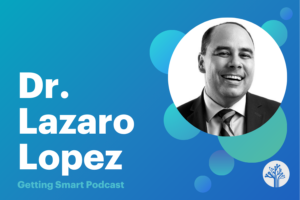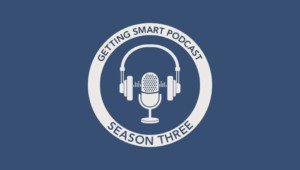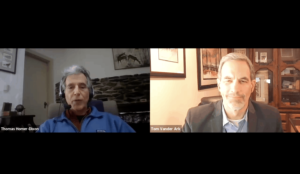Attacking Complexity with Confidence

By Jonathan Rochelle, Katherine Prince and Tom Vander Ark
Of one thing we can be sure: tomorrow will be more complex than today. Technology continues to advance exponentially bringing with it more complex systems which often interact with each other and natural systems in unexpected ways.
Cancer researcher Kevin Jones describes his work as “taking a bath in uncertainty, unknowns, exceptions and outliers.” Dr. Jones thinks the two most important values, given uncertainty in his line of work, are humility and curiosity.
More lines of work involve the bath of uncertainty Dr. Jones experiences. We agree that a complex future warrants intellectual humility and curiosity, but we want every young person to know where to start and what to do when facing a new situation.
What we most desire for young people is confidence in the face of complexity.
A New Ball Game
Speaking to the nation’s EdTech directors (at #COSN18), we made the case that we’ve turned a corner and entered a new era. The World Economic Forum calls this shift the Fourth Industrial Revolution (the first three were driven by steam power, electricity, and the Internet). This new Industrial Revolution is powered by artificial intelligence — code that learns.
 Artificial intelligence (AI) has been around for 50 years, but its power and use have jumped in the last two years. Powered by big data sets produced by a connected world and turbocharged by cheap computing and storage, artificial intelligence now augments every aspect of life:
Artificial intelligence (AI) has been around for 50 years, but its power and use have jumped in the last two years. Powered by big data sets produced by a connected world and turbocharged by cheap computing and storage, artificial intelligence now augments every aspect of life:
- With social platforms, it curates every screen we view
- With sensors and cameras, it powers autonomous vehicles
- With robots, it manages dark warehouses
- With drones, it delivers packages
- With bioinformatics, it enables personalized medicine.
Right behind this wave is distributed ledger technology typically called blockchain. You’ve heard of Bitcoin and all the other cryptocurrencies. They’re all based on a distributed ledger that eliminates the middleman in a transaction. Blockchain is already in use making supply chain transactions more efficient and promises to make college transcripts more portable and secure. It also has the potential to enable new kinds of exchanges and institutions.
When you put this all together, our children will clearly have a different life experience than we did, just as we did compared to our parents, but with maybe an order of magnitude more change. Many of the new human-made systems are extraordinarily complex, and they react in unexpected ways when they interact with each other or with natural systems (think 2010 flash crash, 2011 Fukushima nuclear disaster, 2016 election hacks, 2017 hurricane season).
With this extreme level of change, it’s obvious to ask, “How should education change?” While the answer is less than obvious and could vary in different places and in different circumstances, the one thing that is clear is that our students deserve a new set of learning priorities (not just more added to a crowded set of learning objectives). This is the challenge before us.
Good News/Bad News
Together AI, big data, distributed ledgers, and a growing array of enabling technologies (e.g., wi-fi enabled video doorbells, robots, autonomous vehicles) promise extraordinary wealth and benefit. But across and within most countries (especially the USA), these promises will not be equally distributed.
While forecasts vary widely, we think it’s safe to say that:
- Most jobs will continue to be augmented by smart tools, boosting the skill requirements for incumbents.
- Jobs will change rapidly, creating the need for people to reskill and upskill across their lifetimes.
- Employment structures will continue to become more project-based, whether people are working full-time for one organization or working as freelancers or task masters.
- Job dislocation will accelerate over the next decade as automation improves and drops in price, but it will vary by sector and geography. High labor-cost markets such as the USA will probably see significant dislocation in the middle of the job market in the next two decades. The impacts will also be felt across job levels and categories.
- Job formation opportunities will exist for people and regions that apply an entrepreneurial mindset and skill up quickly. Regions that respond with coordinated and responsive physical and educational infrastructure could see net gains in employment. Others could become the new rust belt of the AI revolution.
Despite these serious implications, there has never been a better time to make a difference — to build an app, launch a campaign, start a business, or make contributions to global problems. Most big challenges and opportunities have giant associated data sets, and it has never been easier to collect and analyze data using smart tools. An exciting example is AI4All, a nonprofit connecting AI experts to high school students in six cities (see feature).
Economic opportunity now lies more in the hands of the people than ever before, rather than just with large, established companies. Starting and running a successful business is within reach for practically anyone — including the farmer with a smartphone who lives 50 miles from the nearest physical market or the crafter in a city who needs to reach her niche buyers around the world. Yet there are also significant social and ethical implications to navigate as we enter the Fourth Industrial Revolution.
New Preparation Priorities
In face of the uncertainty on the horizon, we most want young people to be confident — to be assured by prior success that they know how to address complex situations, how to navigate new places and people, and how to deliver value. Basic literacy remains important in the innovation economy but three new priorities are design thinking, social-emotional skills, and entrepreneurship.
Design thinking, popularized by the Stanford Design School, is a structured approach to problem solving. It starts with problem identification and research into people’s experience. Potential solutions are prototyped and improved through iteration. Computer scientists use a similar approach to design called computational thinking. Design skills should not be relegated to a coding class; it should (like writing) be integrated across the curriculum.
Social and emotional learning provides a foundation for navigating complexity, enabling people to develop strong inner selves that are resilient, reflective, and able to develop positive connections and relationships. Deep self-knowledge, emotional regulation, and social awareness will help people develop other skills and practices necessary to succeed in the emerging era.
Most high school graduates will enter the freelance economy or manage their careers as a series of projects. Freelancing or employed, everyone will be an entrepreneur in the new economy. Taking initiative to spot opportunity, pursuing partnerships, and delivering value will be critical for success.
Powerful Experiences
In a recent KnowledgeWorks report, Katherine and colleagues noted that “In many K-12 environments, responding to these opportunities will mean rethinking how learning is structured and organized; how resources, such as time, technology, and people are allocated to create meaningful learning opportunities; how learning is assessed and progress tracked; how space is used; and how educators are supported in modeling reflective learning and aspirational personal development.”
To flex these new muscles, learners need extended challenges — big integrated projects — that require initiative, design skills, collaboration, and public products. A growing coalition of schools calls this High Quality Project Based Learning (HQPBL).
Learners need space to ask big questions, try new things, and to create. It is more important than ever to help students build confidence by experiencing success in a variety of settings — in problem solving, in the sciences, in work settings, in publication, and in the performing arts.
We need to remove the pessimism attached to the type of feedback that includes “You’re not a math person” or “If you can’t do it quickly, you’re not smart.” We need to bring learners from that feeling of challenge to that feeling of achievement — which is teaching them that they can achieve anything and letting them know what it feels like to be proud of what they can achieve. By developing this confidence at an early age, our students can tackle learning and, more importantly, apply all these new capabilities to the complexity that is coming at us at record pace.
Where to Start?
On one hand, our prescription is pretty simple: help young people experience success in the face of complexity.
On the other hand, we realize that co-constructing a series of powerful learning experiences implies an ambitious change agenda — one with educational, financial, and political challenges. Where to start?
Every community is experiencing high levels of change and is struggling to interpret signals about what’s to come. It’s time for a community conversation. School communities, employers, civic leaders, and service organizations should begin (or accelerate) a conversation about what’s happening, what it means, and how to prepare.
KnowledgeWorks believes an essential first step to this work is to craft, develop and sustain a community-wide vision for personalized, competency-based learning. To guide these conversations, KnowledgeWorks produced a useful Visioning Toolkit: Laying the Groundwork for a Community-Wide Vision for Personalized Learning. It also produced a discussion guide focused on the changing nature of work and readiness, “Shaping the Future of Readiness: A Discussion and Facilitation Guide.”
Portrait of a Graduate from Battelle for Kids is another useful resource for guiding community conversations.
Without fail, we’ve seen these conversations yield thoughtful agreements updating student learning goals and promoting more powerful learning experiences.
Visit schools promoting powerful learning, prototype some learning experiences when you get back, then start a conversation.
For more see:
- The Rise of AI: What’s Happening, What it Means, How to Prepare? (session report from SXSWedu)
- Ask About AI: The Future of Learning and Work (report)
Jonathan Rochelle is Director of Product Management at Google. Katherine Prince is Senior Director of Strategic Foresight at KnowledgeWorks.








Patti Shade
intellectual humility and curiosity, fodder for human creativity!